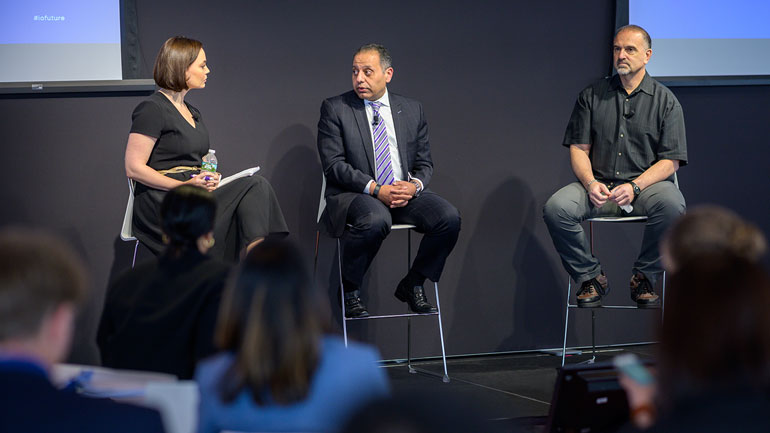
Bristol Myers Squibb’s Head of U.S. Medical, Awny Farajallah, and Regeneron’s Chief Scientific Officer, George Yancopoulos at Panel Discussion with CNBC television reporter Meg Tirrell
Bristol Myers Squibb’s Head of U.S. Medical, Awny Farajallah, and Regeneron’s Chief Scientific Officer, George Yancopoulos, led one panel discussion. CNBC television reporter Meg Tirrell moderated. They shared perspectives on a broad range of topics including the progress to be made to bring the potential of I-O to more patients with different forms of cancer.
There was also an academia-focused panel with James Allison of MD Anderson Cancer Center; Philip D. Greenberg of Fred Hutchinson Cancer Research Center; Robert H. Vonderheide of the University of Pennsylvania; and Jill O'Donnell-Tormey of the Cancer Research Institute.
They discussed critical areas to focus on as researchers seek more individualized approaches for patients. There’s a definitive need to expand research into other areas such as cell therapy and additional immune checkpoints, as well as increasing the collective understanding of biomarkers in I-O, they said.
“Despite great progress, we are still at the beginning,” Farajallah said. “We have made many strides and given patients a renewed hope for survival, but have more work to do; more work to help patients with I-O resistance, more work to research new platforms and therapies, and more work to help drive long-term survival, which is our end goal.”
Prioritized Area of Research
With more I-O therapies available today than ever before, the topic of I-O resistance is a particularly important need among patients and a prioritized area of research for BMS. This area of study seeks to identify why some patients do not respond to or stopped responding to available I-O treatments.
“It’s critical to understand the ‘why’ behind patients who are not responding to I-O treatments," Farajallah stressed.
BMS collaborates with a number of labs to address this question and in fact, has a team of researchers across different disciplines dedicated to this research, he added. It is important to not just understand potential exclusion biomarkers and why patients didn’t respond or stopped responding, but to understand the biopsy journey of the patient and how this evolves before and after treatment. Scientists aim to identify what has changed and figure how they may be able to address it.
In addition to overcoming challenges with current therapies, Farajallah and Yancopoulos agreed on the need for additional treatments and new approaches. Both touched on emerging areas of research within their respective companies.
“At BMS, we have a number of exciting programs both in early research and in the clinic. This includes early technologies focused on antigen presentation, and ongoing work to map the tumor microenvironment and how this pertains to T-cells,” said Farajallah.
The speakers also underscored the importance of collaboration and the continued need for partnership within and beyond industry to advance the science. It takes the whole community together – from academic centers to groups like CRI to industry – to be able to advance the science and improve outcomes for more patients.
“No one company can achieve this,” said Farajallah. “That’s why discussions like these are so incredibly important.”


